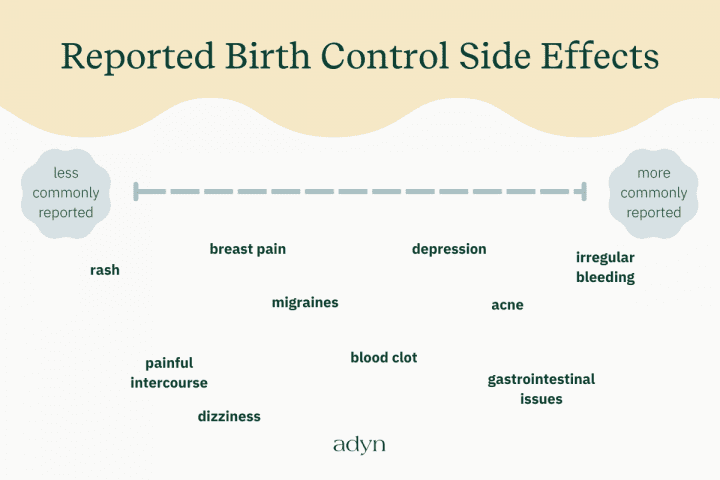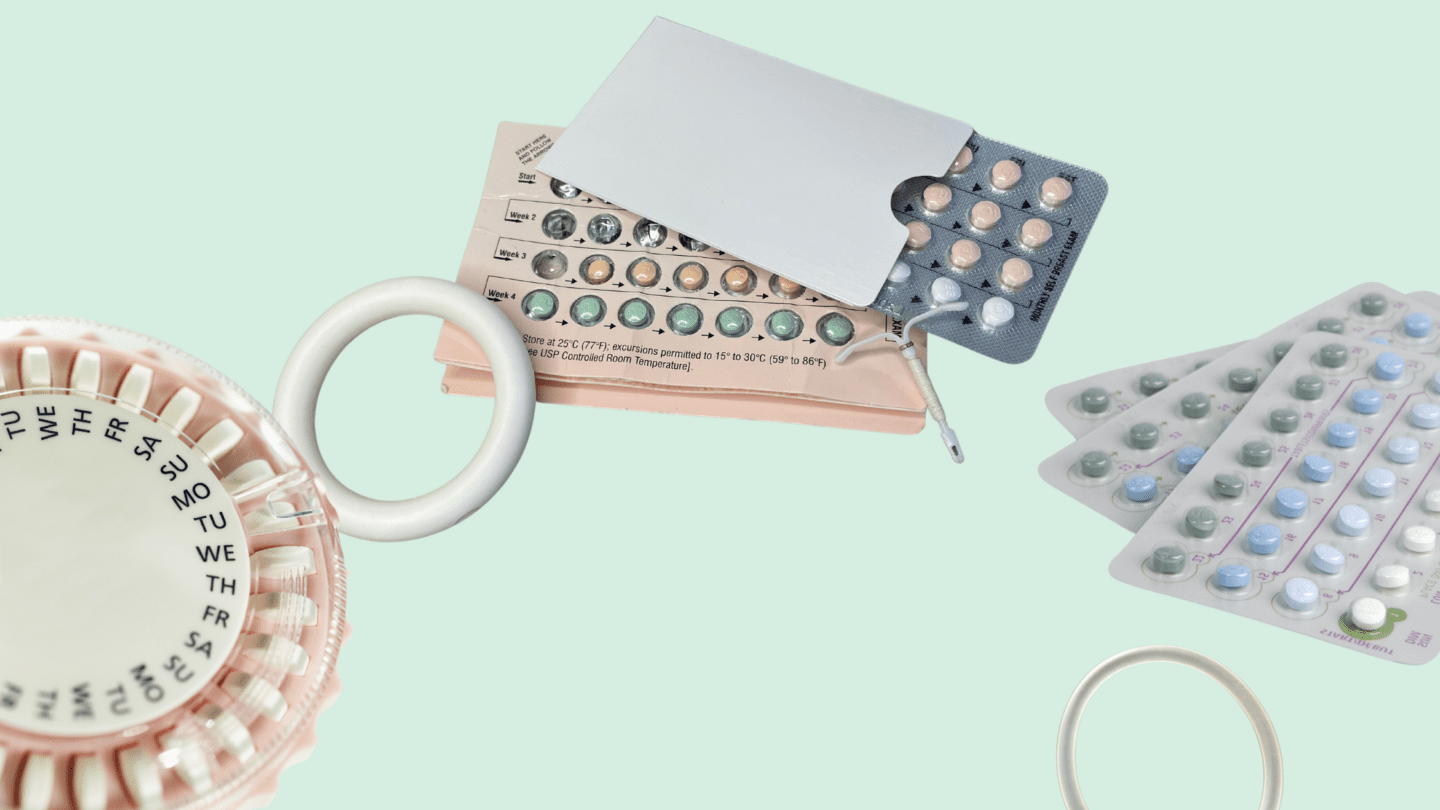Every body is different. That’s why every body can react differently to medications, including different formulations of . It’s important to know the possible side effects of , whether you’re thinking about switching to a new type of or wondering if how you’re currently feeling is a side effect.
It can be tricky to know for sure if something you’re experiencing is a symptom or not. The possible side effects of are extremely variable and can be triggered by plenty of other things. But knowing the likelihood of side effects on different formulations can be a big tip-off, as well as key information that can help you decide whether it’s time to switch methods.
Birth control side effects
Birth control, just like any medication, can have unintended side effects. Human bodies are so complicated that it’s nearly impossible to guarantee a drug will only affect the specific thing you want it to.
For example, many contraceptives contain hormones as active ingredients, since they’re a super effective way to prevent pregnancy (by preventing ovulation). But hormones play a ton of roles in the body, so avoiding so-called “off-target effects” – aka side effects – can be tough. And even though there are a number of non-hormonal forms of , these can have side effects, too.
Is adyn right for you? Take the quiz.
Birth control side effects can range from annoying (e.g. acne) to life-threatening (e.g. blood clots). That means it’s important to take stock of what you might be susceptible to when you’re considering the risks associated with different methods. For example, if you know your family has a history of blood clots, you should take that potential side effect more seriously, perhaps limiting your options to those that are not associated with clots.
That said, a risk of side effects is just that: a risk. A list of potential side effects is not a list of experiences you should expect to have while on ! Some side effects may be more or less likely than others, and some may not happen to you at all.
Some side effects might even be desirable, like not having a period.
If your current seems to be giving you side effects that you don’t want, or you’d like to start on a new form of but are concerned about certain side effects, talk to your doctor.
Common side effects of
Somewhere between 65 and 70 percent of people who stop using their do so because they experienced side effects.1 And although many bad side effects of contraceptives are common, that still doesn’t necessarily mean you should expect or tolerate them. What matters most is finding a that works for your own biology.

Some side effects are more common than others. This infographic shows the most commonly reported side effects across options.
Birth control side effects list
Here are some of the most common side effects of 2 reported:
- Acne
- Weight gain
- Breast tenderness
- Vaginal discharge
- Breakthrough bleeding
- Nausea
- Mood changes
- Sexual effects (e.g. decreased )
- Headaches
- Heavy periods
- Irregular periods
- Hirsutism
- Oily skin
- Absence of periods
Infertility is a side effect that’s often asked about, but there’s actually no evidence that can cause .
How soon do side effects start?
How quickly side effects show up can vary greatly – it depends on the type and the side effect. For instance, some people experience nausea right away when they first start taking birth control pills. Other side effects, like , may take longer to show up.
And, when you first start on , or switch to a new method, you might even experience side effects that are expected to resolve on their own. In other words, they may go away if you wait it out. This is because there’s a so-called “adjustment period” that lasts for three to five months after you start a new .3 If you do experience some of these temporary side effects after starting a new , it’s up to you whether you’re comfortable waiting it out – don’t feel pressured to suffer for five months. That’s a long time!
Some side effects from starting that may resolve in a few weeks or months include:
- Breakthrough bleeding
- Nausea
- Breast tenderness
When side effects don’t improve
If you think you’re experiencing side effects that haven’t improved after the first few weeks or months – or gotten worse over time – you should consider switching methods. The evidence for which formulations cause which side effects is variable, but here’s a run-down of what the evidence does show. This list may help you recognize whether an unwanted symptom you’re feeling may be a result of your current method.
9 of the most common side effects
Breakthrough bleeding
Breakthrough bleeding is or bleeding between periods (or between withdrawal bleeds, if you’re using hormonal forms of ). If you’re experiencing problematic bleeding on hormonal birth control, there’s some evidence that taking a three-day break from your contraceptives can help.4 If the problem persists, you might consider switching to a formulation with more ()5 or switch to a different form of s.6
Breast tenderness
Some people report feeling tenderness in their breasts when they start taking . This often resolves on its own for those taking the pill,7 but is slightly more likely to persist on norelgestromin-containing patches (like Ortho Evra).8
Acne
The relationship between birth control and acne is one of the most complicated, since some people taking some forms of report that their acne actually gets better, while for others it can get worse. Generally, acne is more common in people taking older formulations of progestin-only contraceptives,9 and less common (or improved) in formulations that contain (estradiol), like pills.10
Like what you’re reading? Get the latest straight to your inbox 💌
Decreased
Some people report that they feel less sexual drive, or , on . This side effect has occasionally been reported for those on low-dose pills or the implant,11 but in general evidence is inconsistent across all forms of . There is some evidence that can actually increase for some people while using a levonorgestrel-releasing IUD!12
Depressed mood
Research suggests that all forms of have some association with increased risk of depression, and some forms have a stronger link than others. Progestin-only contraceptives (like the ) and hormonal IUDs are more associated with depression, and this relationship is stronger in adolescents.13-14
Headaches
Headaches can be triggered by changes in levels in the body, and so are more likely to occur in people who are already prone to getting headaches with their cycle. When taking cyclical formulations, like combined oral contraceptives, drops during the scheduled withdrawal period, which can give some people a headache or migraine. Some might experience these symptoms from the change in levels that occur when first starting a new . For the same reasons, some people who have migraines find that their symptoms actually improve when they take that keeps their hormones consistent, like hormonal IUDs.15
Hirsutism
Hirsute is just a fancy way of saying hairy, and it’s true that some forms of can increase hairiness in places that, for some people, is unwanted – like the upper lip, chin, arms, or even back. This side effect is most common in progestin-only forms of .16 There’s no medical reason to be concerned about body hair, but if this concerns you, don’t fret – other options are available.
Weight gain
Weight gain is one of the most commonly asked about side effects of , but there’s actually no conclusive evidence that most forms of could cause it.17 The one exception is the birth control shot, which has a confirmed slight risk of weight gain for some people.18
Don’t suffer in silence
If you’re experiencing any unwanted symptoms that you think might be side effects from your , talk to your doctor! There are so many different formulations out there, you may not have found the best fit for your body yet. Find one that works for you – without side effects.
Here at adyn, we use your biology to help you do just that.
-
- Moreau, Caroline, Kelly Cleland, and James Trussell. “Contraceptive discontinuation attributed to method dissatisfaction in the United States.” Contraception 76.4 (2007): 267-272.
- Barr, Nancy Grossman. “Managing adverse effects of hormonal contraceptives.” American Family Physician 82.12 (2010): 1499-1506.
- Barr, Nancy Grossman. “Managing adverse effects of hormonal contraceptives.” American Family Physician 82.12 (2010): 1499-1506.
- Coffee, Andrea L., Patricia J. Sulak, and Thomas J. Kuehl. “Long-term assessment of symptomatology and satisfaction of an extended oral contraceptive regimen.” Contraception 75.6 (2007): 444-449
- Faculty of Sexual and Reproductive Healthcare, Clinical Effectiveness Unit. “Problematic bleeding with hormonal contraception.” (July 2015)
- Lawrie, Theresa A., et al. “Types of progestogens in combined oral contraception: effectiveness and side‐effects.” Cochrane Database of Systematic Reviews 5 (2011).
- Planned Parenthood. “What are the side effects of the birth control pill?” PlannedParenthood.org (N.D.): Last accessed 2022 May 17.
- Lopez, Laureen M., et al. “Skin patch and vaginal ring versus combined oral contraceptives for contraception.” Cochrane Database of Systematic Reviews 4 (2013).
- Barr, Nancy Grossman. “Managing adverse effects of hormonal contraceptives.” American Family Physician 82.12 (2010): 1499-1506.
- Salvaggio, Heather L., and Andrea L. Zaenglein. “Examining the use of oral contraceptives in the management of acne.” International Journal of Women’s Health 2 (2010): 69.
- Casado-Espada, Nerea M., et al. “Hormonal contraceptives, female sexual dysfunction, and managing strategies: a review.” Journal of Clinical Medicine 8.6 (2019): 908.
- Casado-Espada, Nerea M., et al. “Hormonal contraceptives, female sexual dysfunction, and managing strategies: a review.” Journal of Clinical Medicine 8.6 (2019): 908.
- Lindberg, Malou, et al. “Differences in prescription rates and odds ratios of antidepressant drugs in relation to individual hormonal contraceptives: a nationwide population-based study with age-specific analyses.” The European Journal of Contraception & Reproductive Health Care 17.2 (2012): 106-118.
- Skovlund, Charlotte Wessel, et al. “Association of hormonal contraception with depression.” JAMA Psychiatry 73.11 (2016): 1154-1162.
- Barr, Nancy Grossman. “Managing adverse effects of hormonal contraceptives.” American Family Physician 82.12 (2010): 1499-1506.
- Barr, Nancy Grossman. “Managing adverse effects of hormonal contraceptives.” American Family Physician 82.12 (2010): 1499-1506.
- Barr, Nancy Grossman. “Managing adverse effects of hormonal contraceptives.” American Family Physician 82.12 (2010): 1499-1506.
- Berenson, Abbey B., and Mahbubur Rahman. “Changes in weight, total fat, percent body fat, and central-to-peripheral fat ratio associated with injectable and oral contraceptive use.” American Journal of Obstetrics and Gynecology 200.3 (2009): 329-e1.








